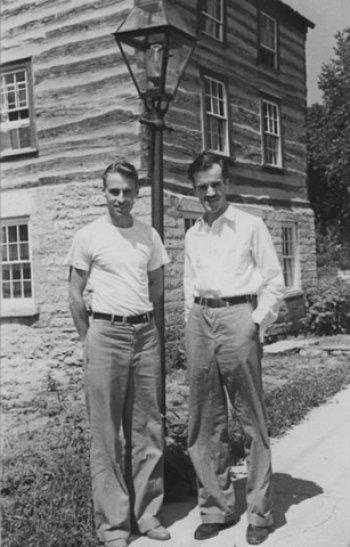The Pattern at Pendarvis
Lawrence Merritt is majestic as a 91-year-old gay man recalling his past as a preservationist to a young gay interviewer in this absorbing character study.

Lawrence Merritt, Gregory Jenson, and David Murray Jaffe in a scene from “The Pattern at Pendarvis” (Photo credit: Dennis Cahlo)
[avatar user=”Darryl Reilly” size=”96″ align=”left” ] Darryl Reilly, Critic[/avatar]When you’ve lived what feels like two life times and everyone… EVERYONE you used to know is gone… you jump – first chance that comes along – to connect with someone again, to look forward to something again… No one’s ever really asked …about US… I miss him. Damn you.
This is said by 91-year-old Edgar Hellum to the young gay Rich Farnsworth who is interviewing him about his life as a preservationist and as a gay man in playwright Dean Gray’s serene, absorbing and concise drama, The Pattern at Pendarvis.
It is December 1997 in Mineral Point, Wisconsin, and Farnsworth (a fictionalized representation of author Will Fellows) has arrived to speak to the real-life Hellum for his book about pioneering preservationists and also seeks to detail what gay life was like in that era. A Wisconsin-native, Hellum arrived there in the 1930’s and met Robert Neal. The two became lovers and began restoring dilapidated cottages that belonged to 19th century Cornish workers; the area became known as Pendarvis. They opened a 24-seat Cornish teashop that was heralded as “one of the seven best small restaurants in the United States” by the Saturday Evening Post. The couple lived openly but discreetly and was quietly accepted by the residents until Neal’s death in 1983. Their efforts revitalized the town as the renovated buildings became a major tourist attraction. Over time, their contributions became unacknowledged because they were gay. Docents who led tours of the site barely mentioned them.

Archival photo of the real Robert Neal and Edgar Hellum (Courtesy of Mineral Point Library Archives)
Mr. Gray infuses his straightforward 70-minute interview treatment with tension, suspense and drama. A third character, Norm Hansen is a 60-year-old straight married board member of Pendarvis who is a close friend of Hellum’s. He provides skillful exposition and while present at the discussion stuffily keeps trying to steer it away from personal disclosures. The dialogue is smooth, efficient and dotted with references to figures of that time such as Frank Lloyd Wright, Syrie Maugham and Duncan Hines.
Lawrence Merritt whose stage career began as a dancer on Broadway in 1962’s No Strings and includes roles in Dear World, Applause, Pippin and Evita is majestic as Edgar Hellum. Entering while hobbling on a cane and then settling into a chair, the white-haired, physically graceful and folksy Mr. Merritt commands attention throughout. Possessed of an appealing tenor vocal delivery that is wistfully halting, fiery and impish, Mr. Merritt totally embodies this aged figure eloquently recalling his past. It’s a lovely performance.
Gregory Jensen marvelously conveys Rich Farnsworth’s youthful enthusiasm and reverence with his animated characterization. Bearded, bespectacled and officious, David Murray Jaffe delightfully portrays Norm Hansen with dry comic authority.
Director Joseph Megel’s staging is suitably simple yet theatrical despite the material being basically three men in a room talking. The pacing is steady, the performances measured and the technical elements are well-integrated.

Lawrence Merritt as Edgar Hellum in a scene from “The Pattern at Pendarvis” (Photo credit: Dennis Cahlo)
A full bookcase, a desk, a table with a phone and some chairs are assembled by scenic design Daniel Ettinger into a perfect study. The side walls have panels on which Joseph Amodei’s aesthetic video designs are projected. These consist of vintage photographs, drawings and news clippings that compliment the dialogue. Mr. Amodei’s lighting design is equally adept. Jeans, chinos, a plaid shirt and a blazer are the ideal pieces costume designer Gail Cooper-Hecht has the cast wearing.
Initially a cozy character study, The Pattern at Pendarvis evolves into a moving work that documents a distant chapter of gay history.
You have to understand something. …Back then, there weren’t any gay people. Of course, there were but… there wasn’t. There wasn’t because you just didn’t talk about it. So… there wasn’t.
The Pattern at Pendarvis (through August 5, 2018)
New Dog Theatre Company and StreetSigns Center for Literature and Performance
HERE, 145, Sixth Avenue, in Manhattan
For tickets, call 212-352-3101 or visit http://www.newdogtheatre.com
Running time: 70 minutes with no intermission






David Murray Jaffe is a wizard in character